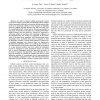Free Online Productivity Tools
i2Speak
i2Symbol
i2OCR
iTex2Img
iWeb2Print
iWeb2Shot
i2Type
iPdf2Split
iPdf2Merge
i2Bopomofo
i2Arabic
i2Style
i2Image
i2PDF
iLatex2Rtf
Sci2ools
ICRA
2007
IEEE
2007
IEEE
Automatic Outlier Detection: A Bayesian Approach
— In order to achieve reliable autonomous control in advanced robotic systems like entertainment robots, assistive robots, humanoid robots and autonomous vehicles, sensory data needs to be absolutely reliable, or some measure of reliability must be available. Bayesian statistics can offer favorable ways of accomplishing such robust sensory data pre-processing. In this paper, we introduce a Bayesian way of dealing with outlierinfested sensory data and develop a “black box” approach to removing outliers in real-time and expressing confidence in the estimated data. We develop our approach in the framework of Bayesian linear regression with heteroscedastic noise. Essentially, every measured data point is assumed to have its individual variance, and the final estimate is achieved by a weighted regression over observed data. An ExpectationMaximization algorithm allows us to estimate the variance of each data point in an incremental algorithm. With the exception of a time horizon (win...
Related Content
| Added | 03 Jun 2010 |
| Updated | 03 Jun 2010 |
| Type | Conference |
| Year | 2007 |
| Where | ICRA |
| Authors | Jo-Anne Ting, Aaron D'Souza, Stefan Schaal |
Comments (0)

